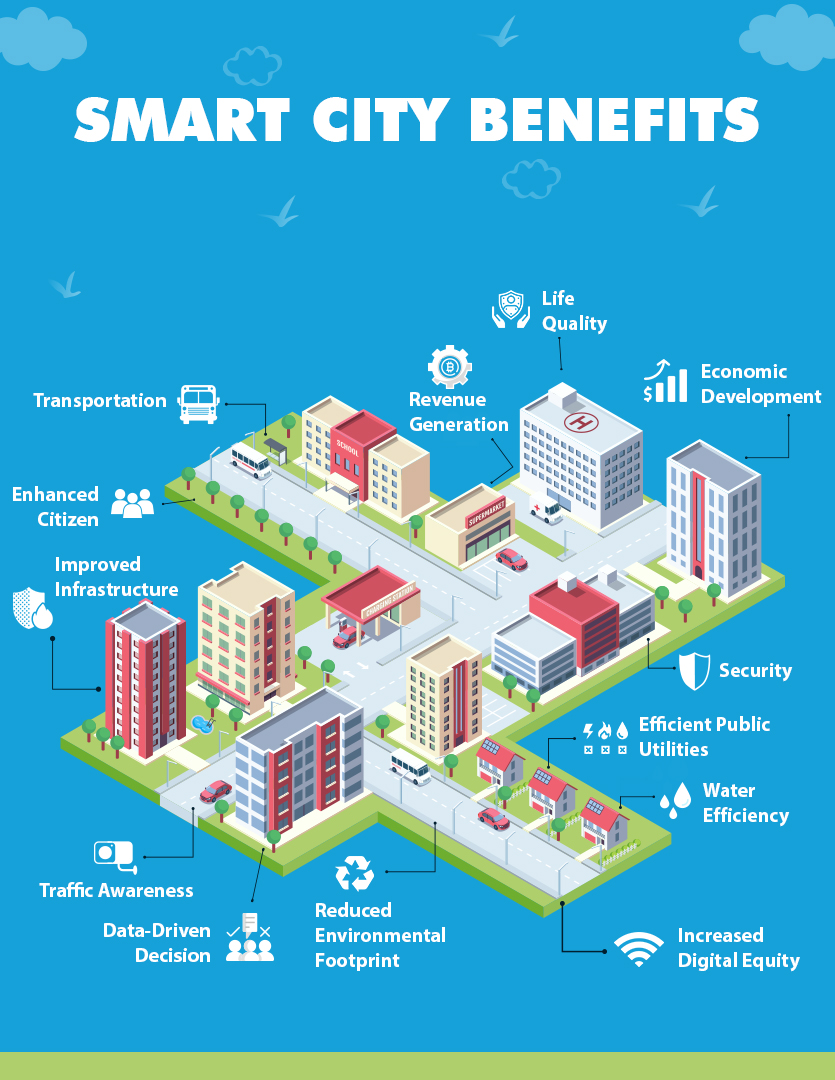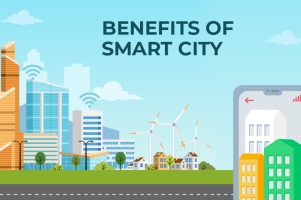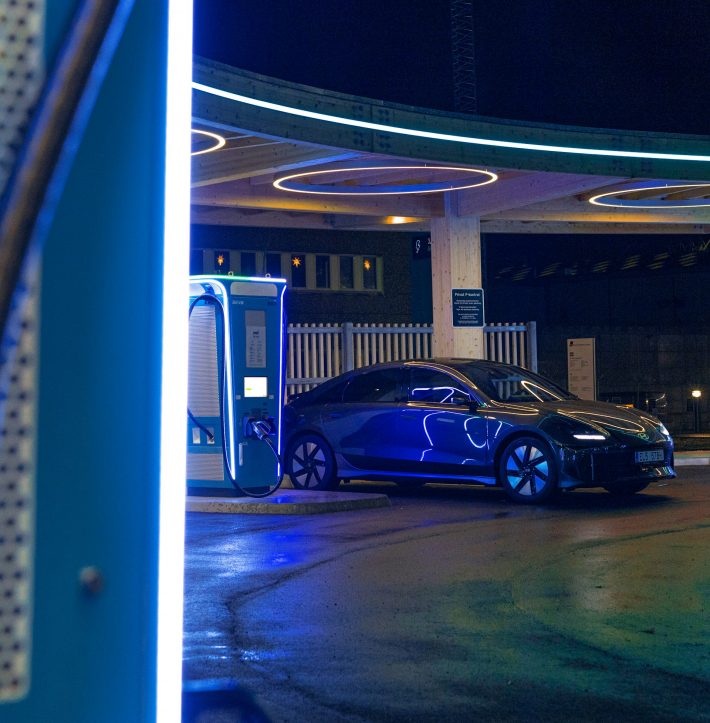In part one of this blog we discussed about the practical and economic benefits and advantages of smart city and smart technology. In the second part and the last part of the blog Harikrishna Kundariya co-founder, director of eSparkBiz Technologies explains, the Environmental benefits of smart city and advantages of smart city technology .
Enhanced citizen and government engagement
Citizens now expect a lot from their cities, and they want to get provided with robust, user-friendly digital services. Collaboration tools, intuitive websites, self-service portals, and mobile applications everything has become standard in every facet of life, and citizens expect no less from their city. Expanding digital services in the society can make the city more attractive for the people to reside in it.
Moreover, accessible government data, interactive maps, government performance dashboards, live-streamed city hall meetings, and active social media presence assist smart cities in promoting a citizen-government relationship. They help in increasing civic engagement and builds trust in city officials.

Advantage: Reduced environmental footprint
With the gradual rise in global warming, greenhouse effect, debris in oceans and trash in streets, smart cities are making an effort to fight against the adverse effects of the environment. The energy-efficient building, air-quality sensors, and renewable energy resources are providing an alternative to cities to shrink the ecological impact.
Air quality sensors in the city can help to determine and track the low quality of the air and identifying pollution causes, and deliver relevant data so that appropriate actions can be taken. These sensors are so far helpful in reducing air pollution in the populated cities.
Effective data-driven decision making
To access overall information of the city, advancement in “big data” and connected devices have played a significant role. A well-designed data analytics strategy helps the city officials to access the massive amount of data covering the whole city. There is a rise in service levels when the city can monitor desired metrics in real-time.
Effective big data applications make it easier to lessen the risk factors in the city; it helps to identify and staff the police in high-risk areas, as well as they can forecast and plan for expansion in the citywide population growth and identify trends, interests, concerns, and needs of the citizens. This enables stronger decision making and enhances the lives of residents by cutting down costs and improving services.
Increased digital equity
To ensure digital equity, individuals must have access to high-speed internet services and affordable devices. Adopting an option of public Wi-Fi hotspots strategically placed throughout the city can offer reliable Internet service to all the residents of the city. The city of Seattle has developed a plan to deliver skills training, ensure availability of affordable devices, and provide accessible and reasonable internet services.
Economic development opportunities
The public investment in smart cities has a substantial potential effect- up to 10 times, according to the recent report, which means massive expansion in gross domestic product growth when cities innovate.
Many private sectors are also partnering up with government officials to invest millions of dollars in smart city projects. Smart city development is playing an increasingly important role in enhancing cities regional and global competitiveness to attract residents and businesses. Providing an open data platform with access to city information helps businesses to study the interaction and activities of citizens and to plan business strategies accordingly by making decisions through data analytics.
Improved infrastructure
Aging roads, bridges, buildings often require a large amount of investment to maintain and repair over their service lives. Smart technology can provide cities with predictive analytics to identify the areas that need to be fixed before the infrastructure failures.
Smart sensors can deliver data showing the changes in the structure, identifying the cracks and tilts in the bridges or buildings and sends messages to notify personnel of the need for inspection and maintenance. These can help cities to save massive tax and prevent infrastructure failure.
Efficient public utilities advantages
Smart technologies provide cities with the tools to conserve and reduce inadvertent waste of water and electricity so that the limited supply of natural resources is not hindered. Smart sensors allow cities to quickly identify leaks in the pipes and fix the damaged segments in a short period, reducing the amount of water loss.
Smart electric grids also allow for two-way communication between electricity providers and consumers to help identify the time of peak usage and outages. Cape Town is an example, which uses smart metering technology to combat the water crisis. These meters track water usage for customers and relay the data to their accounts.
The citizens then get the itemised bill that displays their water consumption. After adopting this method, there was a nearly 40%-60% drop in the level of water consumption. The technology has proved to be a viable solution to help conserve valuable resources.
Life quality

The initiatives of the smart city that prioritise people- both the residents and the visitors above everything else will tend to improve the life quality for everyone residing in the city.
Smart parking, efficient transportation services, public Wi-Fi, digitalised government, these technologies create a positive impact on the life of the citizens as they make things reliable and easier for them.With implementing the smart technologies to create smart cities, there are opportunities across almost all political issues- from housing to transport, to health, to educational services, to environmental conditions, to happiness, to well-being.
Smart city projects should not be confined to particular areas, preferably should be implemented more radically, to specific problem areas where it gets easier to find a solution. This ensures that a smart city strategy improves and enhances life quality inclusively and equitably.
Revenue generation
The smart technologies in smart cities not only provides us with smart solutions and cut downs the costs but also creates new resources to generate revenues through smart initiatives. It can be as simple as- using IoT solutions effectively and implementing road tolling system that cuts down the parking frauds- and leverages city council’s ownership of data and urban infrastructure to find new ways of raising public funds.
Smart sensors generate a vast amount of data on citizen’s needs and behaviour. While there are a few ethical, legal and political limitations on what government can share with the businesses, they can monetise the data at least in some capacity, allowing them to generate value for their constituents which is huge advantage over standard city.
Cities like Milton Keynes, are using paywalls to access their data, charging private sector organisations who want to access it. Sponsorship opportunities can also be maximised to gain extra funding.
Conclusion
Becoming smart does not only include investing in the new upcoming technologies and setting them up in the city but bringing them into implementation, finding the solution to the real-life problems, government officials looking to improve the city operations and at the same time focusing equally on the civic quality of life.
IoT platforms and the devices using these technologies are all good and do great, but if they don’t provide us with a helping hand in dealing with the problems faced by the city, then they are suitable for nothing. Cities need to engage the communities in the process of making the city smarter. It should work towards improvising the quality of residents and not just ease the government operations.
With this, a smart city should also support the idea of sustainable development as it is the basic need of an hour and we cannot compromise in dealing with the valuable natural resources and fall into crisis. Many aspects should be included in the case to make the city work as a smart city. Smart city visions that are holistic, pluralistic, and citizen-centric, focusing on improving services and solving urban issues, will be most effective and cost-efficient in the long run.
They tend to prevent future problems by improving both physical services and infrastructure, and the city’s sense of community.
The author is Harikrishna Kundariya co-founder, director of eSparkBiz Technologies
About the author
Harikrishna Kundariya, a marketer, developer, IoT, ChatBot & Blockchain savvy, designer, co-founder, director of eSparkBiz Technologies, A Mobile App Development Company. His 8+ years experience enables him to provide digital solutions to new start-ups based on IoT and ChatBot.
Gravatar Mail ID:-harikrishna@esparkinfo.com
Comment on this article below or via Twitter: @IoTNow_OR @jcIoTnow










